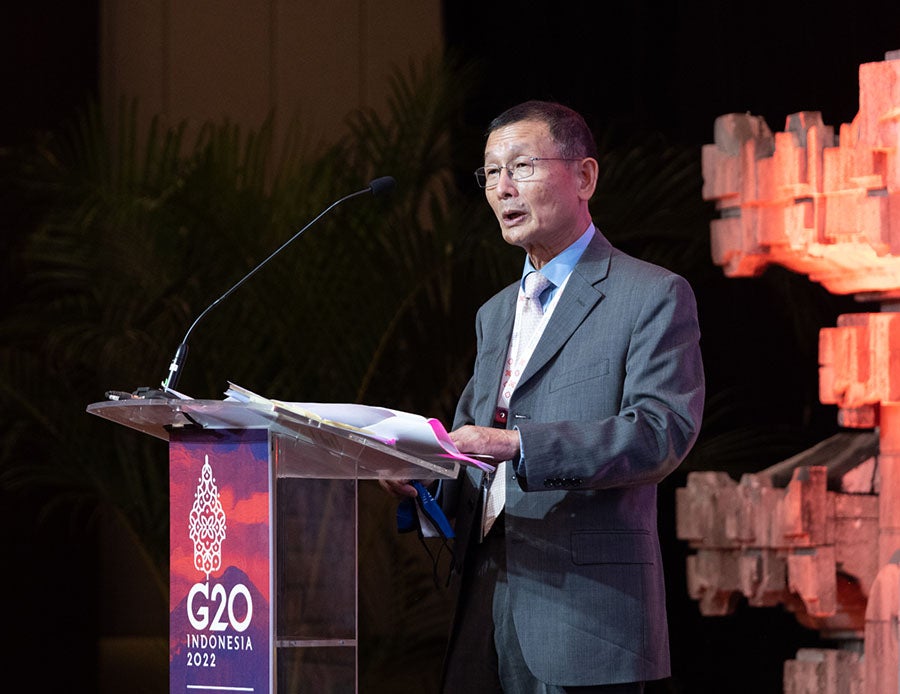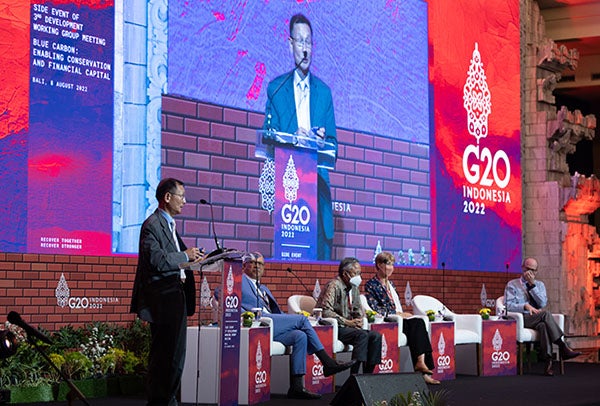KINGSTON, R.I. – Sept. 27, 2022 – Shaw Chen, the interim dean of the University of Rhode Island College of Business, was recently in Bali, Indonesia, to deliver a keynote speech at a G20 Development Working Group – Side Event on “Blue Carbon: Enabling Conservation and Financial Capital.”
The Group of Twenty – an intergovernmental forum of 19 countries and the European Union – was established in 1999 to address the largest issues affecting the global economy, including financial stability, climate change mitigation, and sustainable development. Created about a decade later, the G20 Development Working Group allows member countries to come together to promote action on a wide range of issues facing developing countries, especially low-income countries.

Indonesia, which currently holds the G20 presidency and will host the annual summit of leaders of the member countries in November, is advocating for sustainable management of blue carbon ecosystems worldwide.
Invited by Indonesia’s Ministry of National Development Planning, Chen addressed the United States’ experience in implementing a policy promoting blue carbon – carbon captured and stored in the world’s oceans and coastal ecosystems that reduces greenhouse gas emissions.
“Blue carbon ecosystems can be a potent means for removing carbon dioxide from the atmosphere,” Chen said. “Mangroves, tidal marshes, seagrasses, and other kelp forests are capable of storing carbon dioxide in both the plants and sediment below for thousands of years.
“One of the priorities to achieve climate resilience is a comprehensive mitigation program and disaster management strategy in climate change,” he added. “Mangroves and seagrasses are the key coastal ecosystems that store natural carbon. However, the vital role of blue carbon ecosystems has not been receiving much attention.”
The Aug. 8 forum was central to promoting collaboration and commitment on a wide range of issues related to blue carbon financing and the need for funding from governments to implement mitigation measures, he said.
“This was not the biggest event that I have spoken at but certainly was one of the most significant ones,” said Chen. “I was the only keynote speaker from the United States on the G20 panel and the only academic to share about the opportunity and challenges in implementing blue carbon policy in the U.S.”
His presentation at the conference was made more noteworthy, he said, seeing it came only hours after the U.S. Senate passed a $430 billion bill that included funds to fight climate change.
In his presentation, Chen advocated the U.S. develop a national policy and strategy of blue carbon sequestration, establish restoration priorities for the ecosystems and assess impediments to their restoration. While states and regions have played a vital role in addressing climate change, national and international answers are needed on such a vast problem, he said.
“Governments and intergovernmental organizations are among the most significant funders of climate change action but the growth of public investment is slowing,” he said. “I promoted the increase of the strategic approach of private sector climate investments.”
The popularity of sustainable investment strategies is helping to motivate private sector climate investments, he said. Banks have also played a more prominent role as an intermediary of sustainable and green debt instruments, and starting a broader trend of setting climate targets.
“Carbon financing boosts the financial viability of cutting-edge projects, generating an added revenue stream and allowing for the effective transfer of technologies, knowledge, and expertise,” he said. “It provides a means of leveraging new public and private investment in projects to reduce greenhouse gas emissions globally, including in economies in transition and developing countries.”
Chen, a professor in management science and the Alfred J. Verrecchia-Hasbro Inc. Leadership Chair in Business, has a broad range of expertise in operation management, decision modeling, and finance and strategy. He is a frequent speaker at academic and professional meetings and conferences, including international events such as the Foreign Direct Investment Summit hosted by the People’s Republic of China Ministry of Commerce in 2004.
“A business professor needs to be an expert in many business disciplines,” he said, “including finance, innovation, policy, strategy, marketing, organization behavior, entrepreneurship, human resources, supply chain, and operation.”

